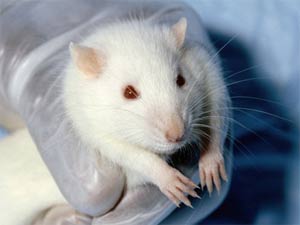New discovery about drug addiction
Chilean scientists have just made an important discovery about the mechanism that helps rats quit smoking. They are continuing their research to find out if the mechanism has the same effect in humans.
In a study published in the journal Science on October 26, experts at Pontifical Catholic University, Santiago, said that the insular cortex of mice had a decisive role in craving rats. or no craving for drugs.
In the trial of mice addicted to amphetamines, the team found that when the island's cortex was disabled by injecting a drug that suppresses the activity of brain cells, the mice did not show any signs of addiction. drug. But when the island's cortex is re-activated, mice show signs of craving for amphetamine.

Tests in mice showed that the insular cortex has a role in drug detoxification.(Photo: Wikipedia, VNN)
Dr. Fernando Torrealba, a member of the research team, said: 'This finding shows that the area in the rat brain processed information about the physiological state of the body and guided the behavior of the mouse'.
In the second experiment, experts used lithium to inject mice. It is a medicine used to treat mental illness and has side effects, such as irritability and pain in the intestine.When the cerebral cortex is inhibited, mice no longer have those symptoms . But, just like the previous test, when the island's cortex was activated again, those symptoms recurred, causing the mice to show drowsiness and difficulty staying.
The team thinks that more is still needed to understand the function of the island's cortical cortex, and they do not yet know how humans will react when this brain region is disabled, especially for a long time. .
The above tests on mice last only about 20 minutes. At one press conference in Santiago, Torrealba said: 'One of the problems to be solved is: If the cortex processes information from the body, what will happen to that information when we are unconscious? effect of human cortex for a long time? Do people lose other cravings (other than stimulants)? That's what we're continuing to study. '
Vinh Tho
- Vietnam has new drugs to help addicts crave for drugs
- Drug addiction also carries genetic factors
- There is a vaccine for detoxification
- 5 things that make people most addicted
- The similarity between sex addicts and drug addicts
- Drug treatment of shopping addiction
- Bim 'addictive' is no different from drugs
- Drug detox with magnets
- New strategy to treat cocaine addiction
- Cedemex: Escape for drug addicts
- Addiction - Decipher the mystery and the solution
- Vaccines help reduce heroin addiction
 Green tea cleans teeth better than mouthwash?
Green tea cleans teeth better than mouthwash? Death kiss: This is why you should not let anyone kiss your baby's lips
Death kiss: This is why you should not let anyone kiss your baby's lips What is salmonellosis?
What is salmonellosis? Caution should be exercised when using aloe vera through eating and drinking
Caution should be exercised when using aloe vera through eating and drinking